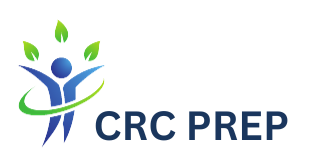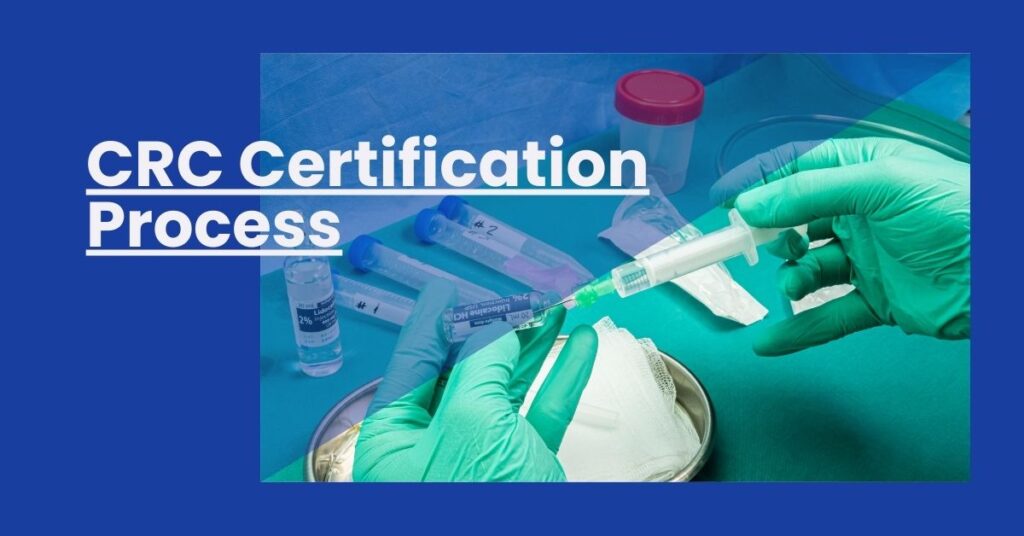The CRC certification process elevates your clinical research career, ensuring you stand out as an expert.
- Eligibility Requirements: Gain insight into the academic and professional experiences needed for the CRC certification process.
- Exam Preparation: Learn effective study strategies and resources to excel in the CRC exam.
- Continuing Education: Understand the importance of ongoing learning to maintain your CRC credentials.
Attaining success in the CRC certification process paves the way for advancement in clinical research.
- Understanding CRC Certification
- Eligibility Criteria for CRC Certification
- The CRC Certification Exam: An Overview
- Preparing for the CRC Exam
- Registration and Scheduling the CRC Exam
- The Certification Process Step by Step
- Maintaining and Renewing CRC Certification
- The Value of CRC Certification in Advancing Your Career
- Additional Resources and Supports for CRC Candidates
- FAQs About the CRC Certification Process
- Conclusion: Your Pathway to Becoming a Certified Clinical Research Coordinator
Understanding CRC Certification
Clinical research coordinators (CRCs) are pivotal players in the orchestration of clinical trials. They ensure the highest standards of patient care while adhering to regulatory and protocol requirements. Acquiring a CRC certification stamps your expertise and dedication to this intricate field. It signals to employers that you’re a proficient coordinator well-versed in Good Clinical Practice (GCP).
What is CRC Certification?
CRC certification, particularly the Certified Clinical Research Coordinator (CCRC) credential, is a specialized professional designation offered by the Association of Clinical Research Professionals (ACRP). It is designed for individuals who aim to establish or enhance a career in the management of clinical research studies.
- Significance: A credential that is widely recognized and respected in the industry.
- Advantages: Opens doors to advanced career opportunities, potentially leading to increased job satisfaction and compensation.
Elevate Your Professional Standing: By achieving CRC certification, you spotlight your commitment to the highest standards of clinical research, thus propelling your career to new heights within this dynamic and rewarding sector.
Eligibility Criteria for CRC Certification
To embark on the crc certification process, you need to evaluate whether you meet the defined prerequisites. Your background in education and professional experience play a pivotal role in this step.
Educational and Professional Prerequisites
- Degree Holders: If you possess a clinical research degree, you need a minimum of 1,500 hours of verifiable work experience in human subject research.
- Non-Degree Holders: Without a degree, the bar is set at 3,000 hours of direct clinical research work experience under an employer-employee relationship.
Achieving the CCRC credential hinges on the successful completion of the CRC Certification Exam, for which eligibility is a prime consideration.
The CRC Certification Exam: An Overview
The CRC certification process culminates in the CRC exam—a comprehensive assessment that gauges your knowledge and skills in clinical research coordination.
Exam Format and Content
Expect a rigorous test spanning over 3 ½ hours, formatted with multiple-choice questions that rigorously test your command over various domains of clinical research coordination.
- Coverage: The exam encompasses twelve domains including but not limited to Crisis and Trauma Counseling, Assessment/Evaluation, and Service Implementation.
Your preparation for the exam should be exhaustive, leaving no stone unturned in your quest for certification.
Preparing for the CRC Exam
Embarking on your CRC exam preparation is a process that requires strategy, resources, and resilience.
Study Strategies and Resources
- Official Materials: Utilize study guides and sample questions tailored specifically for the CRC Exam, provided by organizations like the Commission on Rehabilitation Counselor Certification.
- Additional Prep Tools: Seek out independent resources, for instance, the Mometrix’s CRC Study Guide, which offers an array of practice questions and video tutorials.
Consider forming or joining study groups with peers for a collaborative learning experience.
Registration and Scheduling the CRC Exam
Once you’ve laid the groundwork with diligent prep, the next definitive step in the crc certification process is the registration and scheduling of your exam.
Navigating the Registration Landscape
Registration requires a two-prong approach—application submission followed by scheduling your actual test timeline.
- Application Submission: Begin with setting up an ACRP account, followed by an exam application that will be reviewed—typically updated with a status within a week.
- Scheduling Flexibility: Upon application approval, you’ll have the option to choose a convenient test date through PSI, ACRP’s testing partner, which offers both in-person and remote testing options.
Steering through the registration phase with these actionable items solidifies your path toward gaining that much-coveted certification.
Capitalize On Testing Options: Find solace in the flexibility of the scheduling process for the CRC Exam. Whether you prefer an in-person atmosphere or a remote setup, accommodating options are at your disposal to fit your individual needs.
The Certification Process Step by Step
Embarking on the journey to becoming a Certified Clinical Research Coordinator (CRC) entails a multi-faceted process. Here’s a step-by-step breakdown to guide you along the pathway to certification.
Assessing Your Eligibility
- Review the Prerequisites: Ensure you meet the educational or professional experience requirements as outlined by the ACRP.
- Verifying Experience: Document your work hours in human subject research to verify that they meet the CRC certification criteria.
Application Submission
- Prepare Documentation: Gather all necessary transcripts, employment verification, and other documents pertinent to your application.
- Filling Out the Application: Complete the ACRP’s application form with attention to detail and accuracy.
Exam Preparation
- Create a Study Plan: Allocate regular study times and adhere to a detailed preparation plan leading up to the exam date.
- Leverage Study Resources: Take advantage of ACRP’s preparatory materials and additional independent study guides.
Exam Registration and Scheduling
- Register with ACRP: Once your application is approved, create your ACRP account and proceed with registration for the exam.
- Schedule Your Exam: Select a date and format (in-person or remote) for your exam through PSI’s flexible testing options.
Taking the CRC Certification Exam
- Preparing Mentally and Physically: Rest well and reduce anxiety to be in the best state of mind for the exam.
- Exam Day Strategy: Manage your time wisely across each section, ensuring you answer all questions to the best of your ability.
After the Exam
- Awaiting Results: Results are typically communicated by the ACRP within several weeks post-examination.
- Certification Achievement: Upon successful completion, you’ll receive the Certified Clinical Research Coordinator designation.
Maintenance and Renewal
- Fulfill Continuing Education Requirements: Engage in ongoing learning initiatives and record points as per ACRP’s standards.
- Renew Certification: Follow ACRP’s guidelines for regular certification renewal to maintain your professional status.
Maintaining and Renewing CRC Certification
Post-certification, the CRC certification process doesn’t end. You’re embarking on a journey of continuous professional development to keep your certification active.
Continuing Education: The Keystone of Your Certification
- Earning Credits: You must accrue continuing education or involvement points, which demonstrate your commitment to staying current in the field.
- Diverse Learning Avenues: Participate in webinars, conferences, or other ACRP-approved education programs to gather points.
Committing to Renewal
- Tracking the Cycle: Be well aware of your certification renewal cycle to prevent lapses in your certified status.
- Submission of Documentation: Submit proof of your continuous education and involvement in clinical research every two years for renewal verification.
Staying abreast of evolving practices through continuing education ensures that your expertise remains at the pinnacle of industry standards.
The Value of CRC Certification in Advancing Your Career
The CRC certification is not merely an academic achievement – it’s a catalyst for career progression in clinical research.
Career Development and Recognition
- Enhanced Job Prospects: Employers recognize the CCRC as a hallmark of professional development, opening doors to new career opportunities.
- Promotion Potential: Certified individuals often find themselves eligible for elevated roles within their organizations.
Financial Incentives
- Salary Increase: Certification often correlates with enhanced earning potential due to the acknowledgment of your specialized knowledge and skills.
Let the certification benefits resonate with you as you contemplate the extensive ways in which the CRC certification can enrich your professional journey.
Additional Resources and Supports for CRC Candidates
The path to CRC certification is paved with numerous resources designed to support your success.
Enriching Your Preparation Journey
- Study Groups and Forums: Connect with peers and industry veterans to exchange insights and experiences.
- Official Prep Courses: Explore ACRP’s eLearning courses and interactive workshops geared towards exam readiness.
By engaging with the community and leveraging diverse resources, you solidify your preparedness for the crc certification process.
FAQs About the CRC Certification Process
As you navigate the crc certification process, you might encounter some common inquiries that need clarification.
Addressing Your Queries
- Understanding Exam Content: Get familiar with the specifics of the exam such as question format and key domains.
- Clarifying Recertification: Learn about the timeline and requirements for keeping your CRC certification up-to-date.
Incorporate FAQs into your preparation regimen to enhance your confidence and readiness for the CRC certification.
Conclusion: Your Pathway to Becoming a Certified Clinical Research Coordinator
Your ambition to become a CRC has the potential to reshape your career trajectory. By meticulously following the crc certification process and leveraging the educational resources at your disposal, you’re setting the stage for success in clinical research coordination. Certification is more than a credential—it’s a testament to your dedication to excellence and an investment in your professional future.
Remember, by enhancing your skill set and validating your expertise through certification, you’re not only contributing to the integrity of clinical trials but also significantly impacting public health and medical advancement. The journey is indeed challenging, but the rewards you’ll reap are indelible. Embrace the process, commit to excellence, and let the pathway to CRC certification lead you to your desired career destination.
CRC certification process guide: Master the steps to become a Certified Clinical Research Coordinator and elevate your career in clinical research.

